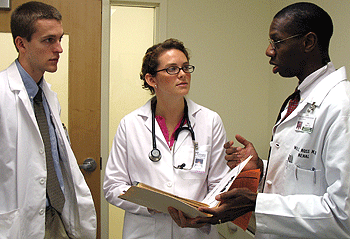Instead of sleeping in, some School of Medicine students spend their Saturday mornings providing free health care to residents of the Forest Park Southeast neighborhood.

From 9 a.m.-noon each Saturday, teams of students and one volunteer attending physician from the School of Medicine see walk-in patients at the Family Care Health Center at 4352 Manchester Ave.
The first- and second-year students take the patients’ histories, while third- and fourth-year students examine the patients and present a diagnosis and treatment plan to the attending physician.
Student coordinators keep track of charts and other paperwork, and later in the week, call the patients to follow up and answer any questions.
“This is the right place to learn about social medicine outside of the academic medical center,” said Will R. Ross, M.D., faculty supervisor, assistant professor of medicine and associate dean for diversity. “The clinic dovetails with the students’ curricular activities.”
About 70 medical students each year are involved in the student-run health clinic, which began in 1997. Now, the not-for-profit center, which charges patients on a sliding scale, has moved into a new, modern building that rivals any private health-care facility.
Cynthia Montana, a second-year student who serves as a coordinator of the Saturday Neighborhood Health Clinic, said the clinic was established to get Forest Park Southeast residents into the health-care system, as many don’t have access to health care.
All patients who are seen in the student-run clinic are uninsured.
“These patients truly are disenfranchised,” Ross said. “They are uncomfortable seeking health care and have difficulty navigating the system. Many haven’t seen a health-care professional in years.”
Bob Geng, a second-year student who serves as a coordinator of the program, said the students encourage the patients to find a health-care home and seek further care, and often refer them to the physicians on staff at the Family Care Health Center on weekdays.
While many patients have chronic diseases such as hypertension and diabetes, most have multiple disorders. Ross said it is incumbent on the students to provide comprehensive care.
“Our goal is to provide holistic health care and give the most extensive evaluation that we can because we’re not sure they will return,” Ross said. “We try to strike a balance between being efficient and being thorough, compassionate and not rushed.”
Ross said he is continually impressed with the students who take part in the Saturday Neighborhood Health Clinic.
“Our students are more assertive here than in the hospital setting, where there is more oversight from the physicians, fellows, residents and interns,” Ross said. “Their autonomy in this setting gives them a sense of confidence.”
The students involved in the clinic say it is a great learning opportunity for medical students at all levels.
Geng said the clinic gives students a sense of making a difference.
“These patients don’t really have a lot of opportunities to get health care, and they rely on this clinic,” Geng said. “I feel privileged to have the opportunity to make a difference in these people’s lives.”
Kimberly Hsu, a second-year student and coordinator, said the volunteer physicians are part of what makes the clinic successful.
“They are dedicated, fun to work with and will gladly volunteer their time to help out in the community and teach medical students,” Hsu said.
“We really need the physicians here,” said Ross, a frequent volunteer. “This is a good opportunity to make a huge impact in the community, as well as to serve as a role model for the students.”
Volunteer physicians are being sought for the Saturday Neighborhood Health Clinic.
They must be board-certified in family medicine, internal medicine or emergency medicine.
For more information, e-mail Montana or Hsu at soccmail@msnotes.wustl.edu or Lauren Anderson at andersonl@wustl.edu.